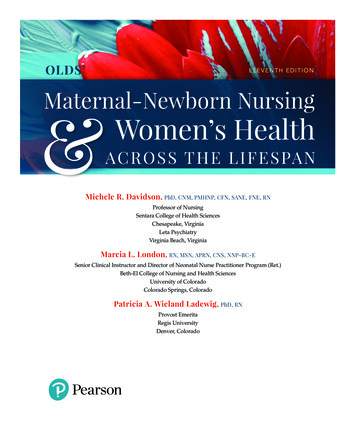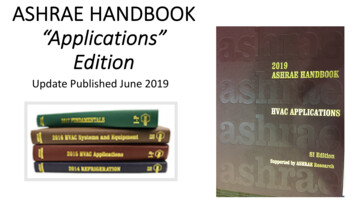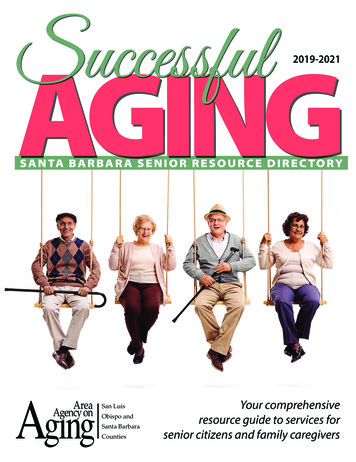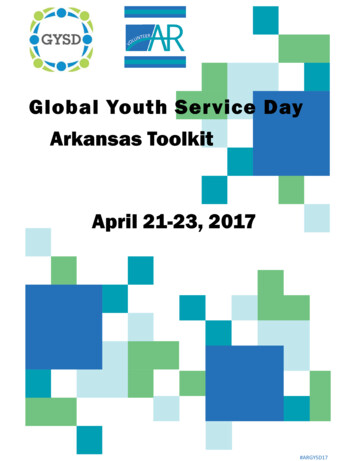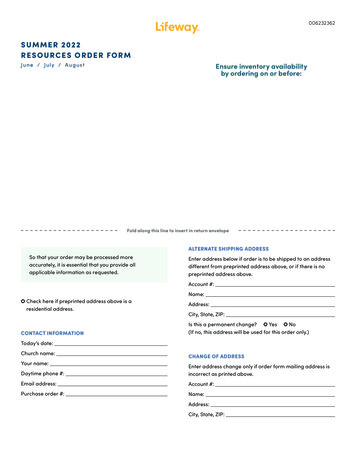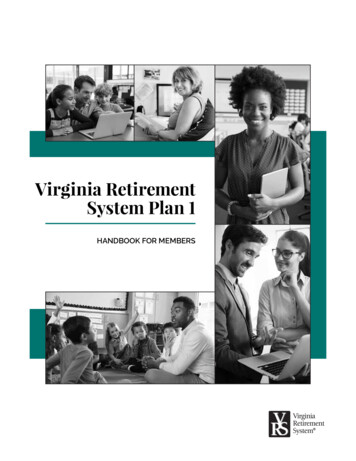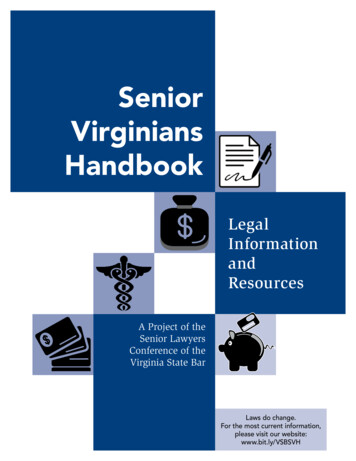
Transcription
esA Project of theSenior LawyersConference of theVirginia State BarLaws do change.For the most current information,please visit our website:www.bit.ly/VSBSVH
Senior Virginians HandbookA Project of the Senior Lawyers Conferenceof the Virginia State BarVirginia State BarAn Agency of the Supreme Court of Virginia1111 East Main Street, Suite 700Richmond, Virginia 23219-0026ACKNOWLEDGMENTSThe Senior Lawyers Conference (“SLC”) gratefully appreciates the assistance of many membersof the SLC who have contributed to this Handbook and its revisions over the years. Severalattorneys who are members of the Virginia Academy of Elder Law Attorneys also stepped upto address sections of this current version. Sincere thanks are due to the following attorneysfor their dedication to making this edition of the Handbook an amazing resource of Virginialaws and programs: Sheri Abrams, Amy Allman, Alan Anderson, Barbara Anderson (editor),Tom Bell, Peter Burnett, Grimes Creasy, Julia Crisfield, John Eure, Doris Gelbman, WayneGlass, Richard Gray, Amy McCullough, Martha McQuade, Jesci Norrington, Kathryn Poe,Tom Tokarz, Robert Vaughan, Martin Wegbreit, Edward Weiner, Loretta Williams, ChristopherWright, and Carter Younger. Thank you also to the staff at the Virginia State Bar who continueto support the mission of the Bar and the SLC.[Copyright 2021]First Printing: September 1979Sixth Printing: December 1991Eleventh Printing: June 2005Second Printing: October 1980Seventh Printing: June 1994Twelfth Printing: March 2009Third Printing: November 1983Eighth Printing: December 1996Thirteenth Printing: January 2013Fourth Printing: June 1988Ninth Printing: January 1999Fourteenth Printing: May 2020Fifth Printing: April 1989Tenth Printing: June 2004Fifteenth Printing: June 2021Senior Virginians Handbooki
Senior Virginians HandbookA Project of the Senior Lawyers Conferenceof the Virginia State BarPREFACEThe Senior Lawyers Conference (“SLC”) of the Virginia State Bar (“VSB”) was established in2001 by Bar Council. Today the membership includes more than 20,000 lawyers age 55 andolder and focuses on issues of interest to senior lawyers and promotion of the welfare of olderresidents of Virginia.The SLC assisted in the implementation of the revised guardianship laws for adults, and preparesand publishes this Senior Virginians Handbook, formerly called the Senior Citizens Handbook.The SLC also provides education and encouragement to lawyers to do proper planning for theirown disability or death and is interested in receiving input from senior lawyers and citizenson issues of concern to them. Your input can help the SCL study issues, present programs andactivities, produce publications of interest, and advocate appropriately. With your feedback wecan work to be sure this publication is accurate and up to date. If you have suggestions foradditional content, find links that are broken, or just want to comment on the book, pleasecontact the VSB at (804) 775-0500 and ask for the SLC’s staff liaison, or email: vsbnews@vsb.org.With the encouragement and support of the bar and the judiciary, the distribution of thisHandbook throughout the Commonwealth is provided as a benefit to Virginia’s older residents.It is our hope that it will continue to serve as a valuable resource to seniors in addressingtheir needs and concerns. Because certain areas of the law are in almost constant change, insome cases the information provided is an overview, with references and contact informationincluded to enable users to access updated information through telephone and online links. Ifyou do not have your own computer to do research, you may be able to use a computer at yourlocal public library, or at a resource center located in the apartment, assisted living center, orcontinuing care retirement community where you reside.CAUTION: IF YOU USE A PUBLIC OR SHARED COMPUTER, DO NOT PROVIDE ANY OF YOURCONFIDENTIAL PERSONAL INFORMATION OR DATA; OTHERWISE YOU MAY BECOME THEVICTIM OF IDENTITY THEFT.The latest version of this Handbook can be found online at vsb.org.Senior Virginians Handbookiii
Senior Virginians HandbookA Project of the Senior Lawyers Conferenceof the Virginia State BarINTRODUCTIONBarbara S. Anderson, Esq.EditorWe “seniors” are an incredibly diverse group thatspans Virginians from age 50 to 100 and reallydefies definition. We are the “GI Generation”who were teenagers during the Great Depressionand fought in World War II. We are the “SilentGeneration” who were too young to see action inWWII but generally believe that conforming toestablished rules guarantees success. We also are the“Baby Boomers” born during the financial boom thatfollowed WWII, demonstrated against the war inVietnam, and joined in the civil rights movement.Many of us are retired but increasing numberscontinue working well into their 70s, 80s, and even90s! We are parents and grandparents raising andsupporting children and grandchildren. We alsoare children caring for our parents! We seniorshave collectively the greatest wealth and the mostsignificant costs of healthcare as we live longer. Howwe balance our needs with the global concerns ofhealthcare, debt, resources, and climate will have adirect impact on our children’s and grandchildren’slives.While it is difficult to label all of us together as“seniors,” that is the current term we use in thisbook until a better moniker is available. The onesingle unifying characteristic we share is that we alllive in Virginia!This Handbook provides summaries and referencesto various laws and programs affecting Virginia’solder residents, as well as practical guidanceto address our concerns. The Handbook also isa guide for identifying and locating public andprivate organizations that provide services to olderVirginians. We hope you find it helpful and welcomeyour comments and thoughts about the content.Please contact the VSB at (804) 775-0500 and ask forthe SLC’s staff liaison, or email: vsbnews@vsb.orgwith your suggestions or comments.Because of frequent changes in laws andprograms, as well as differences in theinterpretation of such laws and programs, theSenior Lawyers Conference and the Virginia StateBar expressly disclaim responsibility for anyerrors or omissions herein. The Senior LawyersConference makes this Handbook available fordownload on the VSB website. You can find themost current version of the Handbook there.Single printed copies also are available from theVirginia State Bar for free.The Virginia State Bar, an administrative agency ofthe Supreme Court of Virginia, publishes brochuresand publications on law-related issues as part ofits mission to advance the availability and qualityof legal services provided to the people of Virginia.These publications are not offered as and do notconstitute legal advice or legal opinions and do notcreate an attorney-client relationship. Brochuresand other publications may be downloaded on theVSB website.Senior Virginians Handbookv
Senior Virginians HandbookTABLE OF CONTENTSPART 1 – FINANCIAL ASSISTANCE . . . . . . . . . . 1Social Security. . . . . . . . . . . . . . . . . . . . . . . . . . . . . . . 1Social Security Disability Insurance. . . . . . . . . . . . . . . 8Pensions . . . . . . . . . . . . . . . . . . . . . . . . . . . . . . . . . . . 9Veterans’ Benefits. . . . . . . . . . . . . . . . . . . . . . . . . . . 11Railroad Retirement Act Benefits. . . . . . . . . . . . . . . 14Supplemental Nutrition AssistancePrograms. . . . . . . . . . . . . . . . . . . . . . . . . . . . . . . . . . 15Rental Assistance Programs. . . . . . . . . . . . . . . . . . . 17Virginia Low Income Home EnergyAssistance Program (LIHEAP). . . . . . . . . . . . . . . . . . 18Telephone Assistance Programs. . . . . . . . . . . . . . . . 18Reverse Mortgages. . . . . . . . . . . . . . . . . . . . . . . . . . 18PART 2 – FEDERAL AND STATE INCOMETAXES . . . . . . . . . . . . . . . . . . . . . . . . . . . . . . . . . . . 21PART 3 – HEALTH CARE . . . . . . . . . . . . . . . . . . . 27Medicaid. . . . . . . . . . . . . . . . . . . . . . . . . . . . . . . . . . 27Medicare . . . . . . . . . . . . . . . . . . . . . . . . . . . . . . . . . 29Dementia and Alzheimer’s Disease . . . . . . . . . . . . . 32PART 4 – LONG-TERM CARE. . . . . . . . . . . . . . . 36Home Care . . . . . . . . . . . . . . . . . . . . . . . . . . . . . . . .Adult Day Care. . . . . . . . . . . . . . . . . . . . . . . . . . . . .Assisted Living Facilities. . . . . . . . . . . . . . . . . . . . . .Skilled Nursing Facilities. . . . . . . . . . . . . . . . . . . . . .Continuing Care Retirement Communities. . . . . . . .3637383942PART 5 – RENTAL HOUSING . . . . . . . . . . . . . . . 45Landlord/Tenant Laws. . . . . . . . . . . . . . . . . . . . . . . . 45PART 6 – DRIVING AND AUTOMOBILES . . . . 55Driving Privileges . . . . . . . . . . . . . . . . . . . . . . . . . . . 55Insurance Coverage . . . . . . . . . . . . . . . . . . . . . . . . . 56PART 7 – PLANNING FOR THE FUTURE. . . . . 57Divorce and Older Citizens. . . . . . . . . . . . . . . . . . . .Estate Planning. . . . . . . . . . . . . . . . . . . . . . . . . . . . .Wills. . . . . . . . . . . . . . . . . . . . . . . . . . . . . . . . . . .Trusts. . . . . . . . . . . . . . . . . . . . . . . . . . . . . . . . . .Special/Supplemental Needs Trusts. . . . . . . . . .Advance Medical Directives . . . . . . . . . . . . . . . .Financial Powers of Attorney. . . . . . . . . . . . . . . .Your Estate Plan. . . . . . . . . . . . . . . . . . . . . . . . . .Preparing Your Will. . . . . . . . . . . . . . . . . . . . .Changing Your Will. . . . . . . . . . . . . . . . . . . . .Dying Without a Will. . . . . . . . . . . . . . . . . . . .Non-Probate Transfers . . . . . . . . . . . . . . . . . .Life Insurance. . . . . . . . . . . . . . . . . . . . . . . . . .Real Estate Transfers. . . . . . . . . . . . . . . . . . . .Estate and Trust Administration. . . . . . . . . . . . . . . .Guardianship and Conservatorship . . . . . . . . . . . . .Funeral Services . . . . . . . . . . . . . . . . . . . . . . . . . . . .5757575859596162626363636364656869PART 8 – PROTECTING YOUR LEGALRIGHTS . . . . . . . . . . . . . . . . . . . . . . . . . . . . . . . . . . 71How To Find a Lawyer. . . . . . . . . . . . . . . . . . . . . . . . 71Selecting and Working with a Lawyer . . . . . . . . . . . 72Virginia’s Judicial System . . . . . . . . . . . . . . . . . . . . . 74Fee Dispute Resolution Program. . . . . . . . . . . . . . . 76Alternative Dispute Resolution. . . . . . . . . . . . . . . . . 80Consumer Guide . . . . . . . . . . . . . . . . . . . . . . . . . . . 81Discrimination. . . . . . . . . . . . . . . . . . . . . . . . . . . . . . 90Employment. . . . . . . . . . . . . . . . . . . . . . . . . . . . . 90Disability. . . . . . . . . . . . . . . . . . . . . . . . . . . . . . . . 91Credit. . . . . . . . . . . . . . . . . . . . . . . . . . . . . . . . . . 94Grandparent Rights. . . . . . . . . . . . . . . . . . . . . . . . . . 95Personal Safety and Security . . . . . . . . . . . . . . . . . . 96Elder Abuse. . . . . . . . . . . . . . . . . . . . . . . . . . . . . . . . 99Scams, Fraud and Identity Theft. . . . . . . . . . . . . . . 100HELPFUL CONTACTS. . . . . . . . . . . . . . . . . . . . . 102Senior Virginians Handbookvii
PART 1 – FINANCIAL ASSISTANCESOCIAL SECURITYSocial Security is a system enacted by Congressdesigned to supplement your retirement income.It is not intended to provide your sole source ofincome—but it adds to the pension benefits, savingsplans, and other investments that you will rely onduring retirement.Different types of benefits are payable under variousprovisions of the Social Security Act, but when theaverage person uses the phrase “Social Securitybenefits,” he or she usually means the Retirement,Survivors, Disability and Health Insurance Program(RSDHI). These are monthly cash benefits paid toyou as a retired or disabled worker; to qualifiedspouses, children, and parents of retired or disabledworkers; and to qualified widows, widowers, anddivorced spouses of workers.The RSDHI Program is financed largely out of taxespaid by employers and employees. It is an insuranceprogram. Benefits received by you and yourdependents have been earned by you through youremployment and the taxes collected regularly fromyour wages. These tax deductions are shown onyour paycheck next to the initials “FICA.” The letters“FICA” stand for “Federal Insurance ContributionsAct,” which is the official name for the federal lawsthat established the Social Security program in1935. These deductions rise periodically. The moneycollected from this tax goes into trust funds, andcurrent benefits are paid out of these funds.Social Security and yourretirement plansSocial Security is part of the retirement plan ofalmost every American worker. If you are amongthe 90 percent of workers who are covered underSocial Security, you should know how the systemworks and what you should receive from SocialSecurity when you retire.How do you qualify forretirement benefits?When you work and paySocial Security taxes, you earn“credits” toward Social Securitybenefits. The number of creditsyou need to get retirementbenefits depends on when you were born. If youwere born in 1929 or later, you need 40 credits (10years of work).If you stop working before you have enough creditsto qualify for benefits, the credits will remain onyour Social Security record. If you return to worklater you can add more credits so that you qualify.No retirement benefits can be paid until you havethe required number of credits.How much will your retirement benefitbe?Your benefit payment is based on how much youearned during your working career. Higher lifetimeearnings result in higher benefits. If there were someyears when you did not work or had low earnings,your benefit amount may be lower than if youhad worked steadily. Your benefit payment also isaffected by the age at which you decide to retire. Ifyou retire at age 62 (the earliest possible retirementage for Social Security), your benefit will be lowerthan if you wait until later to retire. This is explainedin more detail below.Note: Each year, about three months before yourbirthday, you should receive a Social SecurityStatement. It can be a valuable tool to help youplan a secure financial future. It provides you witha record of your earnings and gives estimates ofwhat your Social Security benefits would be atdifferent retirement ages. It also gives an estimateof the disability benefits you could receive if youbecome severely disabled before retirement, as wellas estimates of the survivors’ benefits Social Securitywould provide your spouse and eligible familymembers when you die.Senior Virginians Handbook1
Full retirement ageThe “full retirement age” is 65 for people whowere born before 1938. But because of longer lifeexpectancies, the Social Security law was changedto gradually increase the full retirement age until itreaches age 67. This change affects people born in1938 and later. Check the following table to find yourfull retirement age.Age to receive fullSocial Security benefitsYear of birthFull retirement age1937 or earlier65193865 and 2 months193965 and 4 months194065 and 6 months194165 and 8 months194265 and 10 months1943-195466195566 and 2 months195666 and 4 months195766 and 6 months195866 and 8 months195966 and 10 months1960 and later67NOTE: People who were born on January 1 ofany year should refer to the previous year.Note: Sometimes health problems force people toretire early. If you cannot work because of healthproblems, you should consider applying for SocialSecurity disability benefits. The amount of thedisability benefit is the same as a full, unreducedretirement benefit. If you are receiving Social Securitydisability benefits when you reach full retirement age,those benefits will be converted to retirement benefits.For more information, ask for Disability Benefits(Publication No. 05-10029). You can access thispublication online at www.ssa.gov/pubs/10029.html.Delayed retirementYou may choose to keep working even beyond yourfull retirement age. If you do, you can increase yourfuture Social Security benefits in two ways.First, each additional year you work adds anotheryear of earnings to your Social Security record.Higher lifetime earnings may mean higher benefitswhen you retire.Second, your benefit will increase automatically bya certain percentage from the time you reach yourfull retirement age until you start receiving yourbenefits or until you reach age 70. The percentagevaries depending on your year of birth. For example,if you were born in 1943 or later, 8% per year willbe added to your benefit for each year that youdelay signing up for Social Security beyond your fullretirement age.Note: If you decide to delay your retirement, besure to sign up for Medicare at age 65. In somecircumstances, medical insurance costs more ifyou delay applying for it. Other information aboutMedicare is in SSA Publication 05-10043, whichcan be accessed online at www.ssa.gov/benefits/medicare/.Early retirementDeciding when to retireYou can get Social Security retirement benefits asearly as age 62, but if you retire before your fullretirement age, your benefits will be permanentlyreduced, based on your age. For example, if youretire at age 62, your benefit would be about 25percent lower than what it would be if you waiteduntil you reach full retirement age.Choosing when to retire is an important personaldecision. Regardless of the age you choose to retire,it is a good idea to contact Social Security in advanceto see which month is best to claim benefits. In somecases, your choice of a retirement month could meanhigher benefit payments for you and your family.Some people stop working before age 62. If they do,the years with no earnings will probably mean alower Social Security benefit when they retire.2In deciding when to retire, it is important toremember that financial experts say you will need70-80 percent of your preretirement income to havea comfortable retirement. Since Social Securityreplaces only about 40 percent of pre-retirementSenior Virginians Handbook
income for the average worker, it is important tohave pensions, savings, and investments.It may be to your advantage to have your SocialSecurity benefits start in January, even if you donot plan to retire until later in the year. Dependingon your earnings and your benefit amount, it maybe possible for you to start collecting benefits eventhough you continue to work. Under current rules,many people can receive the most benefits possiblewith an application that is effective in January.You should apply for benefits about three monthsbefore the date you want your benefits to start. Ifyou are not quite ready to retire, but are thinkingabout doing so in the near future, you may want tovisit Social Security’s website to use their convenientand informative retirement planner at: www.socialsecurity.gov/retire2/.Retirement benefits for widows andwidowersWidows and widowers can begin receiving SocialSecurity benefits at age 60, or at age 50 if they aredisabled. And they can take a reduced benefit on onerecord and later switch to a full benefit on the otherrecord. For example, a woman could take a reducedwidow’s benefit at age 60 or 62 and then switch toher full (100 percent) retirement benefit when shereaches full retirement age. The rules vary dependingon the situation, so you should talk with a SocialSecurity representative about the options available toyou.Benefits for family membersIf you are getting Social Security retirement benefits,some members of your family also can receivebenefits. Those who can include: Spouses who are age 62 or older; Spouses who are younger than 62, if they aretaking care of a child entitled on your recordwho is under age 16 or disabled; Former spouses, if they are age 62 or older (seeBenefits for a divorced spouse); Children up to age 18, or up to 19 if they arefull-time students who have not yet graduatedfrom high school; and Disabled children, even if they are age 18 orolder.If you become the parent of a child (including anadopted child) after you begin receiving benefits, youmust inform the Social Security office about the childso they can decide if the child is eligible for benefits.Note: Children’s benefits are available only tounmarried children. However, in certain situations,benefits are payable to a disabled child who marriessomeone who is also eligible as a disabled child.Spouse’s benefitsA spouse who has not worked or who has lowearnings can be entitled to as much as one-half ofthe retired worker’s full benefit. If you are eligible forboth your own retirement benefits and for benefitsas a spouse, Social Security always pays yourown benefits first. If your benefits as a spouse arehigher than your retirement benefits, you will get acombination of benefits equaling the higher spousebenefit.At full retirement age, benefits as a spouse cannotexceed one-half of the retired worker spouse’s fullretirement amount. According to the Social SecurityAdministration: If you were born before January 2, 1954and have already reached full retirementage, you can choose to receive only thespouse’s benefit and delay receiving yourretirement benefit until a later date. If yourspouse is full retirement age and applyingfor spouse’s benefits only, they can applyonline by using the retirement application.Your spouse can also contact us to schedulean appointment. If your spouse’s birthday is January 2, 1954or later, the option to take only one benefitat full retirement age no longer exists. If yourspouse files for one benefit, they will beeffectively filing for all retirement or spousalbenefits.If you have reached your full retirement age and areeligible for a spouse’s or ex-spouse’s benefit andyour own retirement benefit, you may choose toreceive only spouse’s benefits and continue accruingdelayed retirement credits on your own SocialSecurity record. You may then file for benefits laterand receive a higher monthly benefit based on theeffect of delayed retirement credits.Senior Virginians Handbook3
If you are receiving a pension based on work whereyou did not pay Social Security taxes, your spouse’sbenefit may be reduced. Additional information onpensions from work not covered by Social Securitycan be found in the Detailed Calculator provided bySocial Security regarding pensions from work notcovered by Social Security, which can be accessedonline at: www.ssa.gov/OACT/anypia/anypia.html.Remarriage before the age of sixty generallyprecludes you from collecting retirement benefitsbased on your former spouse’s Social Securityearnings record unless your subsequent marriageends as a result of divorce, annulment, or death. Youmay be entitled to collect retirement benefits on yourformer spouse’s Social Security earnings record ifyour remarriage occurred after your sixtieth birthday.If spouses want to get Social Security retirementbenefits before reaching full retirement age, theamount of the benefit is reduced permanently. Theamount of reduction depends on when the personreaches full retirement age. The Social SecurityQuick Calculator for determining the amount of yourspousal benefit, based upon your date of birth andthe effective date that you wish to begin receivingbenefits can be accessed online at: www.ssa.gov/oact/quickcalc/spouse.html.Divorce does not necessarily preclude you fromreceiving survivor’s benefits if your former spousedies. You may be entitled to receive such benefitsif the marriage lasted ten years or more. If you areat least sixty years old, the survivor’s benefits youreceive will not affect the amount of benefits towhich other survivors may be entitled. In the eventthat you receive survivor’s benefits, you are entitledto receive retirement benefits as early as age sixtytwo if you are eligible for such benefits and theamount of retirement benefits you are eligible for isin excess of the survivor’s benefits you are currentlycollecting.Note: Your current spouse cannot receive spouse’sbenefits until you (the worker) file for retirementbenefits.Maximum family benefitsIf your children are eligible for Social Security, eachwill receive up to one-half of your full benefit. Butthere is a limit to the amount of money that canbe paid to you and your family—usually 150-180percent of your own benefit payment. If the totalbenefits due to your spouse and children are morethan this limit, their benefits will be reduced. Yourbenefit will not be affected.Social Security Benefits and DivorceThere are specific rules governing the impact ofdivorce on the receipt of Social Security benefits.Even though you are divorced, you may be entitledto collect Social Security retirement benefits on yourformer spouse’s Social Security earnings record ifyou satisfy the following requirements: (1) you musthave been married to that former spouse for at leastten years prior to your divorce, (2) you are at leastsixty-two years old, (3) you are currently unmarried,and (4) you are not eligible for an equal or higherbenefit on your own Social Security earnings recordor on someone else’s Social Security earnings record.If you receive retirement benefits on your formerspouse’s Social Security earnings record, the amountof benefits you get will have no effect on the amountof benefits your former spouse and/or his or hercurrent spouse receive.4This is a brief summary of the rules pertaining tothe impact of divorce on your ability to collect SocialSecurity benefits on your former spouse’s earningsrecord and is in no way a complete explanation ofthis topic. For more information and for the specificrules pertaining to your situation, please contact theSocial Security Administration at (800) 772-1213 oronline at: www.ssa.gov/retire2/yourdivspouse.htm.How do you sign up for Social Security?You can apply for retirement benefits online at www.socialsecurity.gov or you can call 1 (800) 772-1213.Or you can make an appointment to visit any SocialSecurity office to apply in person.Depending on your circumstances, you will needsome or all the documents listed below. But do notdelay applying for benefits because you do not haveall the information.Information needed: Your Social Security number; Your birth certificate; Your W-2 forms or self-employment tax returnfor last year; Your military discharge papers if you hadmilitary service;Senior Virginians Handbook
Your spouse’s birth certificate and SocialSecurity number if he or she is applying forbenefits; Children’s birth certificates and Social Securitynumbers, if you are applying for children’sbenefits; Proof of U.S. citizenship or lawful alien status ifyou (or a spouse or child applying for benefits)were not born in the United States; and The name of your bank and your accountnumber so your benefits can be depositeddirectly into your account.You will need to submit original documents or copiescertified by the issuing office.Right to appealIf you disagree with a decision made on your claim,you can appeal it. For an explanation of the stepsyou can take, you can access The Appeals Process(Publication No. 05-10041) online at: www.ssa.gov/pubs/10041.html.You have the right to be represented by an attorneyor other qualified person of your choice. Formore information, you can access Your Right ToRepresentation (Publication No. 05-10075) online at:www.ssa.gov/pubs/10075.html.If you work and get benefits at thesame timeYou can continue to work and still receive retirementbenefits. Your earnings in (or after) the month youreach your full retirement age will not reduce yourSocial Security benefits. However, your benefits willbe reduced if your earnings exceed certain limits forthe months before you reach your full retirementage. (See Age to Receive Full Social Security Benefits,to find your full retirement age.)Here is how it works: If you are younger than full retirement age, 1 inbenefits will be deducted for each 2 in earningsthat you have above the annual limit. In the year you reach your full retirement age,your benefits will be reduced 1 for every 3that you earn over an annual limit until themonth you reach full retirement age. Once you reach full retirement age, you cankeep working, and your Social Security benefitwill not be reduced no matter how much youearn. If, during the year, your earnings are higher orlower than you estimated, let the Social Securityoffice know as soon as possible so that they canadjust your benefits.A special monthly ruleA special rule applies to your earnings for one year,usually your first year of retirement. Under this rule,you can receive a full
of the Virginia State Bar PREFACE The Senior Lawyers Conference ("SLC") of the Virginia State Bar ("VSB") was established in 2001 by Bar Council. Today the membership includes more than 20,000 lawyers age 55 and older and focuses on issues of interest to senior lawyers and promotion of the welfare of older residents of Virginia.



